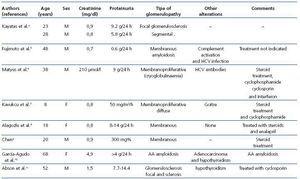To the Editor,
“Horseshoe” kidney (HK) is one of the most common congenital malformations of the genitourinary system.1 It is often associated with other renal or extrarenal anomalies, among which are tumours2 and several types of glomerular diseases.3 We describe a patient with HK, renal adenocarcinoma (RAC) and nephrotic syndrome with morphological substrate of focal segmental glomerulosclerosis (FSG) as well as the possible relationship between the two.
We present the case of a 38-year-old male patient referred for nephrotic syndrome. He is a smoker, has Hodgkin’s disease and ischaemic heart disease. He is found to have a HK in a routine ultrasound.
A week before admittance (October 2007), he starts showing symptoms of oedemas. The biochemistry showed: proteinuria 18g/24h, serum albumin 2.1g/dl and hyperlipaemia, associated with microhematuria and serum creatinine 1.6mg/dl. Examination results: blood pressure 103/60mmHg, body mass index (BMI) 21kg/m2 and generalised oedemas. Normal haemogram and coagulation study. ANA, anti-DNA, ANCAS, anti-MBG antibodies, cryoglobulins, lupus anticoagulant, anticardiolipin antibodies and hepatitis B and C antivirus antibodies as well as human immunodeficiency virus (HIV), all negative. The ultrasound and CT scan confirmed HK, with a tumour on the upper pole of the right kidney (Figure 1a). The cystography was normal. A nephrectomy with exeresis of the inferior isthmus is performed. Following surgery there was localised bleeding and partially recovered acute renal failure (creatinine 3mg/dl).
The piece removed in the nephrectomy measured 14x6cm with a tumour measuring 4x4.5cm. The microscopic study confirms renal adenocarcinoma with a pattern of chromophobe and eosinophilic cells (Figure 1b). The renal vein was not infiltrated.
The optical microscope study of an adjacent wedge displayed larger glomeruli, some of which were hyalinised. In the rest, there was an increase in the mesangial matrix and capillary collapse with several foam cells, interstitial fibrosis and infiltration of inflammatory cells. Mesangial and parietal deposits of IgM and C3 were detected in the immunofluorescence with segmental and focal distribution (Figure 1c and Figure 1d).
The patient maintained nephrotic syndrome in subsequent check-ups, which was treated with simvastastin, dicumarol, losartan and prednisone. He presented high digestive haemorrhage and spontaneous peritonitis in the following months, these improved with medical treatment and discontinuation of steroids. The clinical and biochemical nephrotic syndrome is maintained with progressive deterioration in kidney function, nephrogenic anaemia and hypothyroidism, pending dialysis.
HK can be associated with several renal tumours. Over 200 cases have been reported of which RAC is a distinguishing feature.2,4 However, other types of tumours have been described such as transitional cell carcinoma, Wilms’ tumour, nephroblastoma, carcinoid, sarcoma and oncocytoma. Urinary stasis, infections and abnormal embryogenesis may also be involved in its pathogenesis.
The association between HK and several glomerular diseases has also been reported (Table 1).3,5-11 In certain cases, this association is a coincidence,5,6 but in other cases it is believed that the HK predisposes the glomerular diseases because it facilitates immune complex deposition.7-9 In our case, we demonstrated the presence of corticoresistant FSG, with glomerulomegaly, not associated with obesity or vesicoureteral reflux. Although it has been accepted that FSG secondary to hyperfiltration does not develop complete nephrotic syndrome despite massive proteinuria,12 our case would not be considered under this rule.
Lastly, several renal or extrarenal tumours could be associated with several types of glomerulopathies: with minimal changes, IgA nephropathy, membranous, extracapillary proliferative and amyloidosis.10,13-15 Most authors that have described the association between RAC and FSG reach the conclusion that the most determining factor is glomerular hyperfiltration due to reduction of functioning renal mass, as we believe has occurred with our patient.
To summarise, HK can be associated with RAC and nephrotic syndrome with FSG secondary to hyperfiltration which evolves towards chronic renal failure.
Table 1. "Horseshoe" kidney and glomerular diseases
Figure 1. a) Abdominal CT: horseshoe kidney with mass on the upper pole of the right kidney (arrows), b) renal adenocarcinoma with tumour cells with papillary structures, c) large glomeruli with thickening of the capillary wall, d) mesangial and parietal IgM deposi












